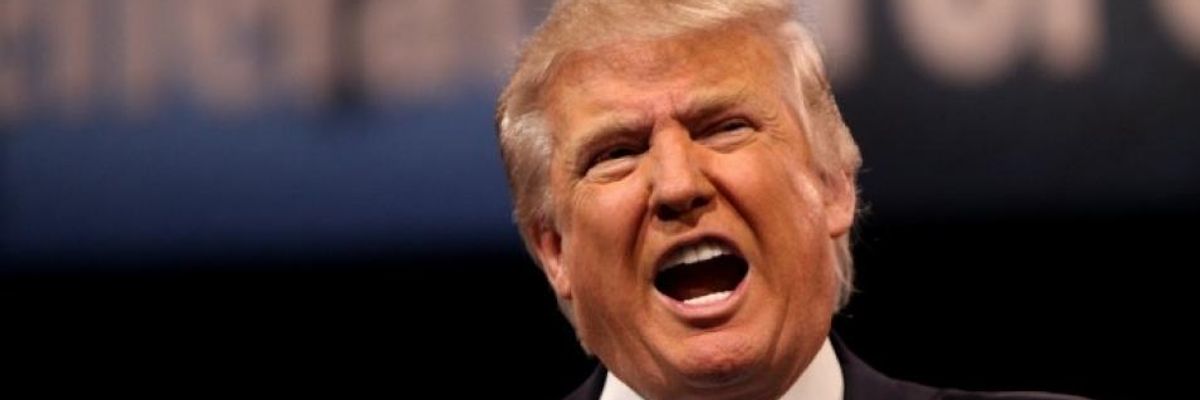The rabid, racial-nationalist Trump was on full display in Phoenix Tuesday night, in a speech CNN's Don Lemon called "A total eclipse of the facts."
The Phoenix Trump stood in sharp contrast to the more conciliatory Trump we heard just one night before, in his scripted address to the nation on Afghanistan.
"We can find the inspiration our country needs to unify, to heal, and to remain one nation, under God," he told a military audience on Monday.
On Tuesday, in what was a billed as a campaign speech just eight months into his presidency, he said, "the only people giving a platform to these hate groups is the media themselves and the fake news."
Charlottesville's Shadow
Trump's comments in Phoenix come on the heels one of the most tense and contentious moments of his deeply divisive presidency: the white supremacist mobilization in Charlottesville, Virginia which resulted in the murder of anti-racist activist Heather Heyer.
The Phoenix rally, which frequently veered off-script, was exactly a week after Trump delivered an off-script rant blaming "both sides" for the violence in Charlottesville, drawing criticism from across the political spectrum.
Thousands Descend
It was no surprise, then, that thousands on both sides came to Phoenix - some to cheer the President, and others to jeer him.
The rumor was that Trump would use the occasion of the speech to pardon former Maricopa County sheriff Joe Arpaio, who was convicted of contempt of court for willfully violating a court order to stop racial profiling.
Greg Stanton, the Democratic Mayor of Phoenix had implored Trump to delay his trip to the city until things cooled down from Charlottesville and the President's inflammatory comments.
"America is hurting," Stanton wrote. "And it is hurting largely because Trump has doused racial tensions with gasoline. With his planned visit to Phoenix on Tuesday, I fear the president may be looking to light a match."
Sheriff Joe
The White House did not cancel or postpone the event, but they did promise Trump would not pardon Arpaio at the event. But Trump did all but pardon him in the speech.
"I think he's gonna be just fine," Trump said. "But, but, I won't do it tonight because I don't want to cause any controversy. Is that ok? But Sheriff Joe can feel good."
Trump also railed against the media, blaming reporting of his comments for the criticism he received in the past two weeks.
"I hit 'em with neo-Nazi," he said. "I hit 'em with everything. I got the white supremacist, the neo-Nazi. I got 'em all in there. Let's see. KKK? We have KKK. I got 'em all. So they're having a hard time. So what did they say, right? 'It should have been sooner; he's a racist.'"
Bait and Switch
'I checked off all these things,' thinks Trump, so why are people so upset? Of course he left out his reference to "hatred, bigotry and violence on many sides."
This is the essence of Trump's rhetorical handling of race. He says "they call me a racist" in mock surprise - this from the guy whose first act as a candidate was to call Mexicans rapists. Then he adds, "they are trying to take away our culture."
Trump says, "racism is evil," then trades in the most base racial stereotypes. This is from the same man who as a candidate claimed, "I am the least racist person you have ever met," a statement which immediately calls into question one's intentions.
Whose Champion?
Trump has stocked his Cabinet with billionaires, and champions a legislative agenda that targets people of color for repression, discrimination and vilification.
Trump's border wall proposal has been exposed as unrealistic, ineffective, outrageously expensive, and silly. It's main purpose is in fact ideological. The idea of the wall gives a clear physical representation to the anti-immigrant sentiment of his base.
Trump's Wall is a monument of hate, as surely as any statue of Robert E. Lee.
The Trump administration's rollback of civil rights enforcement and police oversight, the Muslim ban, the increase in family-destroying deportations, the dismantling of the social safety net - the list of violations gets longer by the day.
All of these measures disproportionately impact communities of color, and materially contribute to racism far more than his rhetoric.
Trump's Heart
Trump takes advantage of a popular misconception about racism. For many, racism is viewed as a personal matter, something held in the heart. Racism is an expression of bigotry alone.
Presidential counselor Kellyanne Conway famously said judge Trump by "what's in his heart," not what "comes out of his mouth."
By this reasoning, since we can't really know what's in Trump's heart, how can he be a racist?
But racism is much more than deeply felt racial bias, or even marching white supremacists. Racism is a system of oppression that promotes power and privilege for white people in the real world, and oppresses people of color.
It doesn't matter what's in Trump's heart or mind. It doesn't matter what his intentions are. His actions, words and policies support and advance racism. Trump is in fact racism's main spokesperson today. And its main policy advocate.
Hate Rising
This is why so-called "alt-right" white supremacists, as well as old-fashioned Klansmen and Nazi adore Trump. This is why his name has become a weapon to hurl at victims of hate crimes.
This also why hate crimes are on the rise since Trump's election.
Avowed racists understand clearly that Trump has to say "love" and "unity" and "racism is evil." But they also know that once he makes the required nod to acceptability, that the dog-whistle racist code words will be unleashed.
When Trump says he condemns racism "in the strongest of possible terms," it's not the same as actually condemning it in the strongest of terms.
Trump can continue to call for love and unity, but he's actually just spreading the hate.

